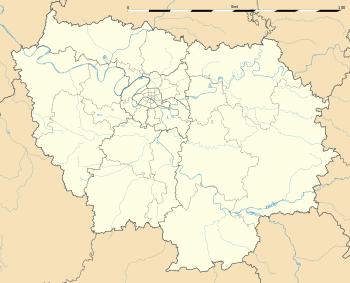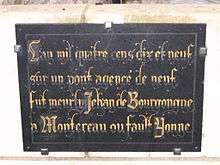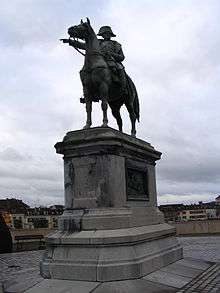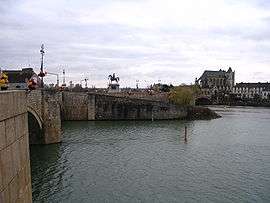Montereau-Fault-Yonne
| Montereau-Fault-Yonne | |
|---|---|
|
Bridges over rivers Seine (foreground), Yonne (background) and statue of Napoléon | |
 Montereau-Fault-Yonne | |
|
Location within Île-de-France region  Montereau-Fault-Yonne | |
| Coordinates: 48°23′07″N 2°57′03″E / 48.3853°N 2.9508°ECoordinates: 48°23′07″N 2°57′03″E / 48.3853°N 2.9508°E | |
| Country | France |
| Region | Île-de-France |
| Department | Seine-et-Marne |
| Arrondissement | Provins |
| Canton | Montereau-Fault-Yonne |
| Intercommunality | Deux Fleuves |
| Government | |
| • Mayor (2008–2014) | Yves Jégo (UDI) |
| Area1 | 9.1 km2 (3.5 sq mi) |
| Population (2012)2 | 16,682 |
| • Density | 1,800/km2 (4,700/sq mi) |
| Time zone | CET (UTC+1) |
| • Summer (DST) | CEST (UTC+2) |
| INSEE/Postal code | 77305 / 77130 |
| Elevation |
47–121 m (154–397 ft) (avg. 53 m or 174 ft) |
|
1 French Land Register data, which excludes lakes, ponds, glaciers > 1 km² (0.386 sq mi or 247 acres) and river estuaries. 2 Population without double counting: residents of multiple communes (e.g., students and military personnel) only counted once. | |
Montereau-Fault-Yonne (French pronunciation: [mɔ̃.tʁo fot jɔn]), or simply Montereau, is a commune in the Seine-et-Marne department in the Île-de-France region in north-central France.
Name
The city takes its name from its geographical position on the confluence of the Yonne and the Seine rivers. Fault, also spelled faut comes from the verb faillir ("to fail") in its old meaning to fall. Montereau is where the Yonne falls into the Seine.
Sights

The town is split in three by the rivers, ville basse situated on the southern shore and Surville on the hill to the north. The old town centre is located in ville basse while Surville is an assembly of high rise buildings, erected after World War II, and is in many ways a typical cité in the Île-de-France. Some of these high rise buildings are now (2005) going to be destroyed and replaced by individual houses. The old château-park in Surville (now the site of a high school Lycée André Malraux) however gives a very nice view over the confluent and the Seine-et-Marne region. On the east side, between the two rivers, are the port and an industrial park.
History
In 1359, the King of Navarre Charles II of Navarre, who held the town because of his Champagne ascent, lost it to the regent of France (the future king Charles V).

John the Fearless was killed on the town's bridge in September, 1419 by Tanneguy du Chastel and the sire de Barbazan, during a conference with the dauphin (who became in 1422 Charles VII). An inscription on the bridge recalls the event. In the collegiate church Notre-Dame-et-Saint-Loup there is a sword which has long been said to be John the Fearless', but actually this sword is certainly more recent.[1]
In 1420, Philip the Good, the son of John the Fearless, seized the town, which remained for eight years in the hands of the Anglo-Burgundian coalition. However, at the end of a long siege, the king Charles VII, helped by Chabannes and Dunois, managed to take it again.
In 1567, during the Wars of Religion, Condé briefly seized the town.
In 1587, the inhabitants of Montereau sided with the Catholic League, but in 1590 they accepted the legitimacy of the new king Henry IV.

Montereau was also the place of one of the last victories of Napoleon on 14 February 1814.
Demographics
Inhabitants of Montereau-Fault-Yonne are called Monterelais.[2]
| Historical population | |||||||||||||||||||||||||||||||||||||||||||||||||||||||||||||||||||||||||||||||||||||||||||||||||||||||||||||||||||||||||||||
|---|---|---|---|---|---|---|---|---|---|---|---|---|---|---|---|---|---|---|---|---|---|---|---|---|---|---|---|---|---|---|---|---|---|---|---|---|---|---|---|---|---|---|---|---|---|---|---|---|---|---|---|---|---|---|---|---|---|---|---|---|---|---|---|---|---|---|---|---|---|---|---|---|---|---|---|---|---|---|---|---|---|---|---|---|---|---|---|---|---|---|---|---|---|---|---|---|---|---|---|---|---|---|---|---|---|---|---|---|---|---|---|---|---|---|---|---|---|---|---|---|---|---|---|---|---|
|
|
| |||||||||||||||||||||||||||||||||||||||||||||||||||||||||||||||||||||||||||||||||||||||||||||||||||||||||||||||||||||||||||
| Data since 1962 : Population without double counting, Data since 2006 : Municipal population Source: Cassini,[3] INSEE[4] | |||||||||||||||||||||||||||||||||||||||||||||||||||||||||||||||||||||||||||||||||||||||||||||||||||||||||||||||||||||||||||||

The canton, which belonged to the arrondissement of Fontainebleau in the beginning, was attached to Provins in 1926. It has 14 communes and 33,934 inhabitants.
Economy
Historically, the city has sported a strong industrial base and thus has strong blue collar roots. In recent decades, unemployment has become an increasing problem, especially within the immigrant community in Surville.
Twin towns
Montereau is twinned with the British town of Otley, north of Leeds.
See also
References
- ↑ http://www.amis-collegiale-montereau.org/petite%20histoire.htm
- ↑ http://www.habitants.fr/habitants_montereau-fault-yonne_77305.html
- ↑ http://cassini.ehess.fr/ Population par commune avant 1962 (résultats publiés au journal officiel ou conservés aux archives départementales)
- ↑ INSEE: Population depuis le recensement de 1962
External links
| Wikimedia Commons has media related to Montereau-Fault-Yonne. |
- 1999 Land Use, from IAURIF (Institute for Urban Planning and Development of the Paris-Île-de-France région) (English)
- French Ministry of Culture list for Montereau-Fault-Yonne (French)
- Map of Montereau-Fault-Yonne on Michelin (English)
